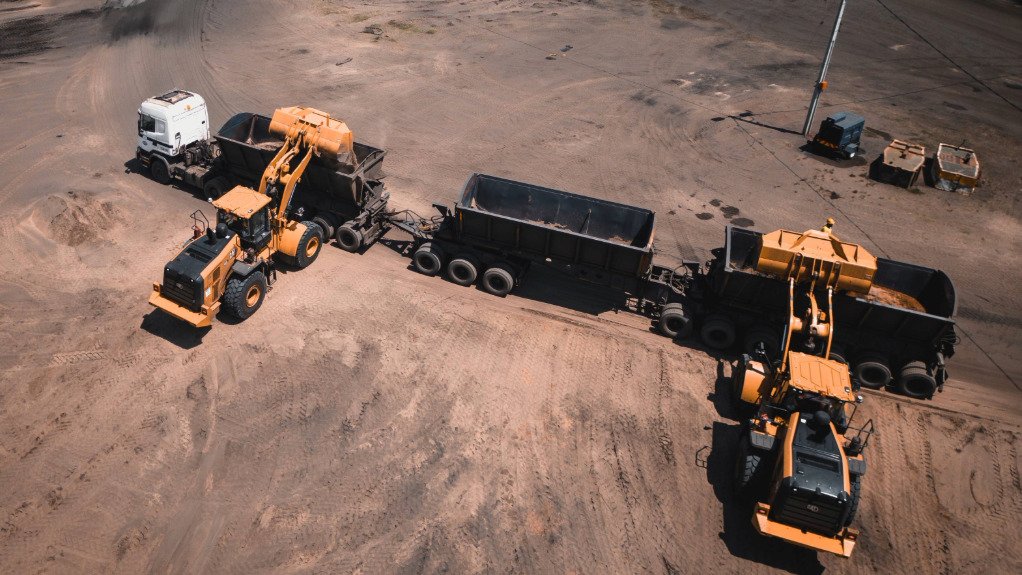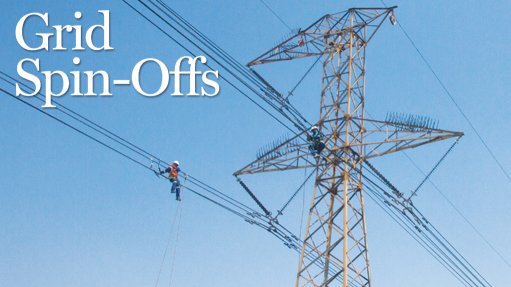Performance vehicles paying off for services provider


NAVIGATING ROUGH TERRAIN The design of PBS vehicles incorporates enhanced stability and advanced braking systems, resulting in improved manoeuvrability and lower operating costs
Photo by Unitrans
Driven by a foundational need to address the inherent complexities of bulk materials handling in the mining sector, end-to-end logistics and supply chain solutions provider Unitrans has adopted performance-based standards (PBS) vehicles into its business to cater to the mining industry.
According to Unitrans, PBS – first launched in 2007 – is the foundation of an alternative regulatory system for heavy vehicles in South Africa.
The PBS system represents a more flexible and performance-orientated evolution of traditional prescriptive regulations, where heavy vehicles are designed according to how they perform against a set of safety standards, rather than physical dimensions or appearance.
PBS vehicles incorporate enhanced stability and braking systems, thereby resulting in improved manoeuvrability – features Unitrans mining division COO John Kettlewell says are critical for navigating the challenging and often rough terrains found at mine sites.
As an early adopter of PBS technology, Unitrans’ primary motivation was to engineer solutions that will directly tackle these issues.
“The industry faces significant challenges tied to moving massive quantities of materials efficiently and safely, often in remote areas with constrained or underdeveloped road and rail infrastructure,” he says.
However, Kettlewell notes that there is a common misconception around the cost of a PBS vehicle in that while they involve a higher upfront capital investment compared to conventional trucks, the long-term returns on using such vehicles are “substantial”.
The benefits of PBS vehicles include a reduction in operating costs, increased productivity and enhanced safety that “far outweigh” the initial outlay, says Kettlewell.
Unitrans, in adopting PBS technology, identified an opportunity to move beyond conventional transport methods and offer its clients a tailored approach that enhances productivity, improves safety and promotes sustainability.
Increasing Efficiency
The core methodology behind implementing PBS vehicles is matching the right vehicle to the right operation, ensuring increased efficiency for the specific demands of each project.
Independent studies have confirmed the effectiveness of PBS vehicles, says Kettlewell, adding that they are proven to be less likely to be involved in a collision on a per kilometre travelled basis, compared to their conventional counterparts.
This inherent safety is further augmented by technologies that Unitrans integrates, such as in-cab camera technologies and fatigue monitoring systems, which are essential for 24-hour operations.
Unitrans’ PBS vehicles are custom-engineered for specific tasks and commodities, thereby ensuring such vehicles can withstand the rigorous conditions of a particular operation, from various road conditions to the material being hauled.
In addition to this, the vehicle’s ability to carry significantly larger payloads, up to 140 t, means that fewer trips are required, which not only improves efficiency but also serves to reduce traffic congestion at a mine site, as well as lowers the overall mechanical strain on a mining vehicle fleet, thereby contributing to greater reliability and uptime.
Through adopting PBS technology, Unitrans has registered a 20% reduction in fuel burn for every tonne hauled using the vehicles.
“This figure is calculated by comparing the litres of fuel consumed against the total tonnes of material transported by PBS vehicles versus conventional trucks performing the same task,” explains Kettlewell.
The most significant benefit of using PBS vehicles, he says, is their increased payload capacity, which enables the haulage of more material in a single trip – a factor further serving to help lower fuel consumption, even if the vehicle itself is larger than its predecessors.
Designed with modern and efficient engine technology, and optimised drivetrains that are matched to the specific operational requirements of a specific mining application, he says PBS vehicles are capable of operating in their most efficient power and torque range.
“Fewer vehicle movements lead to less time spent idling, accelerating and decelerating, all of which are fuel-intensive activities. This directly translates into lower overall fuel consumption for the entire operation,” highlights Kettlewell.
Fleet Integration
Unitrans’ transition to a PBS fleet necessitated specialised training and operational adjustments to ensure safety and increase efficiency, with vehicle operators requiring specific training that goes beyond the standard heavy vehicle licensing.
This training includes advanced instruction on the unique handling characteristics of these larger, more complex vehicle configurations, as the turning dynamics, stability limits and braking performance of PBS vehicles are significantly different from traditional trucks.
Unitrans also places a strong emphasis on understanding the integrated technologies of PBS trucks, such as the fatigue monitoring and proximity detection systems.
In addition to this, Kettlewell says maintenance schedules and procedures also need to be adapted for PBS systems and that, in this regard, Unitrans’ technical teams receive training on the specific requirements of these custom-built vehicles.
Further, operational ground personnel are also trained on new procedures for loading and unloading PBS vehicles as they have higher capacities. Training also needs to be provided regarding managing site traffic in the case of fewer, but larger, vehicles operating.
Article Enquiry
Email Article
Save Article
Feedback
To advertise email advertising@creamermedia.co.za or click here
Press Office
Announcements
What's On
Subscribe to improve your user experience...
Option 1 (equivalent of R125 a month):
Receive a weekly copy of Creamer Media's Engineering News & Mining Weekly magazine
(print copy for those in South Africa and e-magazine for those outside of South Africa)
Receive daily email newsletters
Access to full search results
Access archive of magazine back copies
Access to Projects in Progress
Access to ONE Research Report of your choice in PDF format
Option 2 (equivalent of R375 a month):
All benefits from Option 1
PLUS
Access to Creamer Media's Research Channel Africa for ALL Research Reports, in PDF format, on various industrial and mining sectors
including Electricity; Water; Energy Transition; Hydrogen; Roads, Rail and Ports; Coal; Gold; Platinum; Battery Metals; etc.
Already a subscriber?
Forgotten your password?
Receive weekly copy of Creamer Media's Engineering News & Mining Weekly magazine (print copy for those in South Africa and e-magazine for those outside of South Africa)
➕
Recieve daily email newsletters
➕
Access to full search results
➕
Access archive of magazine back copies
➕
Access to Projects in Progress
➕
Access to ONE Research Report of your choice in PDF format
RESEARCH CHANNEL AFRICA
R4500 (equivalent of R375 a month)
SUBSCRIBEAll benefits from Option 1
➕
Access to Creamer Media's Research Channel Africa for ALL Research Reports on various industrial and mining sectors, in PDF format, including on:
Electricity
➕
Water
➕
Energy Transition
➕
Hydrogen
➕
Roads, Rail and Ports
➕
Coal
➕
Gold
➕
Platinum
➕
Battery Metals
➕
etc.
Receive all benefits from Option 1 or Option 2 delivered to numerous people at your company
➕
Multiple User names and Passwords for simultaneous log-ins
➕
Intranet integration access to all in your organisation



















